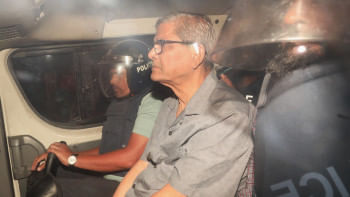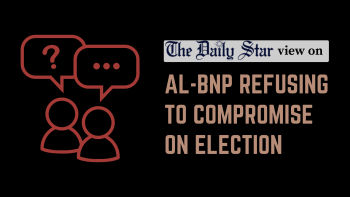Dialogue must be on equal footing

The United States has reiterated what we have been saying for months: that the two major political parties of Bangladesh should sort out their differences through dialogue for the sake of a free, fair and participatory general election. Recently, US Assistant Secretary for South and Central Asian Affairs Donald Lu sent letters to Awami League, BNP and Jatiya Party (JaPa), inviting them to hold talks, without any condition attached, to end the current political stalemate.
It is, we must admit, unfortunate that a foreign country needs to spell out the basics of how to resolve political differences—through political means—although doing so, amid zero signs of any attempt at reconciliation from any side, does add some pressure. Right now, AL and BNP are firmly set on a collision course, each refusing to budge on their stances: the first determined to go ahead with the election under the incumbent government, and the second (and other like-minded parties) adamant about having a neutral election-time government. So far, neither party seems very enthusiastic about Donald Lu's call. Only JaPa has expressed its interest, although, frankly, it may be of little consequence given its ceremonial role in the bigger scheme of things.
Whether all parties will eventually see eye to eye on holding dialogue remains to be seen. But what is not being said enough is that the success of any dialogue requires a sense of being on equal footing for all parties. It requires building confidence and evening the playing ground a bit. That is proving to be a major hurdle with the ruling Awami League keeping the opposition on such a tight leash that it is, quite literally, unable to attend a dialogue even if it wants to, with many central leaders behind bars and local leaders and activists facing the triple whammy of arrests, cases, and imprisonment. This is hardly the ideal environment for dialogue, but this is also precisely why a dialogue must happen.
With the election less than two months away, escalating tensions between the two major parties is creating an environment of fear in the country, particularly because of the spate of violence we have seen over the past few weeks. We do not want to see another election where people are deprived of the chance to elect representatives of their own choosing. Reportedly, the Election Commission (EC) is scheduled to sit down on Wednesday to plan the polls schedule. Regardless of the pointlessness of having a schedule without having the basic building blocks of a participatory election, we hope that AL and BNP will see the urgency of dialogue now more than ever. And to that end, AL must take the first step.


 For all latest news, follow The Daily Star's Google News channel.
For all latest news, follow The Daily Star's Google News channel. 









Comments